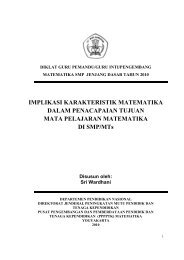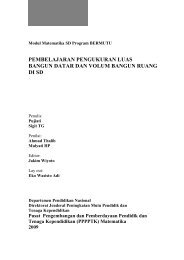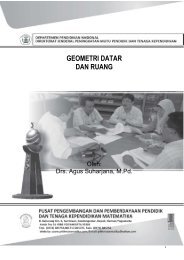25 Biggest Mistakes Teachers Make and How to Avoid Them
25 Biggest Mistakes Teachers Make and How to Avoid Them
25 Biggest Mistakes Teachers Make and How to Avoid Them
You also want an ePaper? Increase the reach of your titles
YUMPU automatically turns print PDFs into web optimized ePapers that Google loves.
112 Classroom Management <strong>and</strong> Instruction<br />
my friend’s parents because my dad worked swing shift <strong>and</strong> my mom didn’t drive. At<br />
my friend’s house, things were chaotic. Her mother couldn’t find film <strong>and</strong> batteries for<br />
the camera. As time got closer <strong>and</strong> closer <strong>to</strong> the concert time, I got more <strong>and</strong> more<br />
anxious. “Your mom knows the orchestra is first?” I asked my friend.<br />
Her mom insisted we would not be late, but we were. When we got <strong>to</strong> the school,<br />
I ran <strong>to</strong> the b<strong>and</strong> room, grabbed my violin out of the case, <strong>and</strong> ran down the hall.<br />
I opened the door <strong>to</strong> the gym just as the orchestra played the first note of our first<br />
song. I knew I couldn’t come running in <strong>and</strong> interrupt while they were playing. I burst<br />
in<strong>to</strong> tears. The b<strong>and</strong> members waiting <strong>to</strong> play next insisted the teacher would underst<strong>and</strong>.<br />
“You don’t know Miss J.,” I bawled. “She said if we weren’t here we’d fail.”<br />
When Miss J. came out in the hall, she looked like she could have killed me, even<br />
though I was still hiccupping from crying so hard. She said she’d talk <strong>to</strong> me about it the<br />
next day <strong>and</strong> that I could at least play in the finale. The next day she <strong>to</strong>ld me, “I realize<br />
that you were late for reasons beyond your control <strong>and</strong> you did play in the last song.<br />
So, in view of that I will not give you an F. You will get a C.”<br />
I’d had an A up until that point. To this day, I don’t think I’ve forgiven her. As an adult,<br />
I wonder how she could punish a thirteen-year-old for something, knowing an adult<br />
had been <strong>to</strong> blame, not me. I had even brought a note from that parent explaining <strong>and</strong><br />
apologizing. Fortunately, I still love <strong>to</strong> play the violin. (Amazing.)<br />
The teacher was underst<strong>and</strong>ably<br />
angry with the student for<br />
being late <strong>to</strong> the concert. <strong>How</strong>ever, her<br />
reaction <strong>to</strong> a situation that was obviously<br />
out of the child’s control was<br />
extreme, punitive, <strong>and</strong> irrational. The<br />
student indicated that she brought a<br />
note confirming that it was the adult’s<br />
fault that she was late. The teacher<br />
obviously ignored this acknowledgment<br />
<strong>and</strong> remained steadfast in her<br />
resolve <strong>to</strong> punish the student.<br />
In extenuating circumstances like<br />
this, effective teachers are flexible.<br />
They show empathy <strong>and</strong> underst<strong>and</strong>ing<br />
for what was obviously an agonizing<br />
situation for the child. The<br />
teacher’s intent was <strong>to</strong> have a m<strong>and</strong>a<strong>to</strong>ry<br />
policy that permitted no exceptions<br />
under any circumstances. Pol icies<br />
that are this rigid are bound <strong>to</strong> break<br />
somewhere. In this case, it broke the<br />
spirit of an innocent child. <strong>Teachers</strong>’<br />
policies should not be like dry, brittle,<br />
rigid sticks but more like green<br />
branches that bend in a gracious<br />
bow of forgiveness <strong>and</strong> underst<strong>and</strong>ing<br />
in extenuating circumstances. The<br />
teacher let the student play in the<br />
finale <strong>and</strong> she should have s<strong>to</strong>pped<br />
there. The child had been punished<br />
enough. Lowering her grade at this<br />
point was more of a punishment than<br />
an assessment. It is reasonable that<br />
teachers should communicate rules <strong>to</strong><br />
students, should expect that the rules<br />
be followed, <strong>and</strong> should have appropriate<br />
consequences if they are not<br />
followed. <strong>Teachers</strong> also should communicate<br />
that each case will be judged<br />
by its own merits.<br />
The teacher’s inflexibility about<br />
rules is reminiscent of Piaget’s (1965)<br />
concept of moral realism where children<br />
see rules as absolute with no<br />
consideration of intent. In a similar<br />
childlike manner, this teacher did not<br />
consider her student’s intentions.





